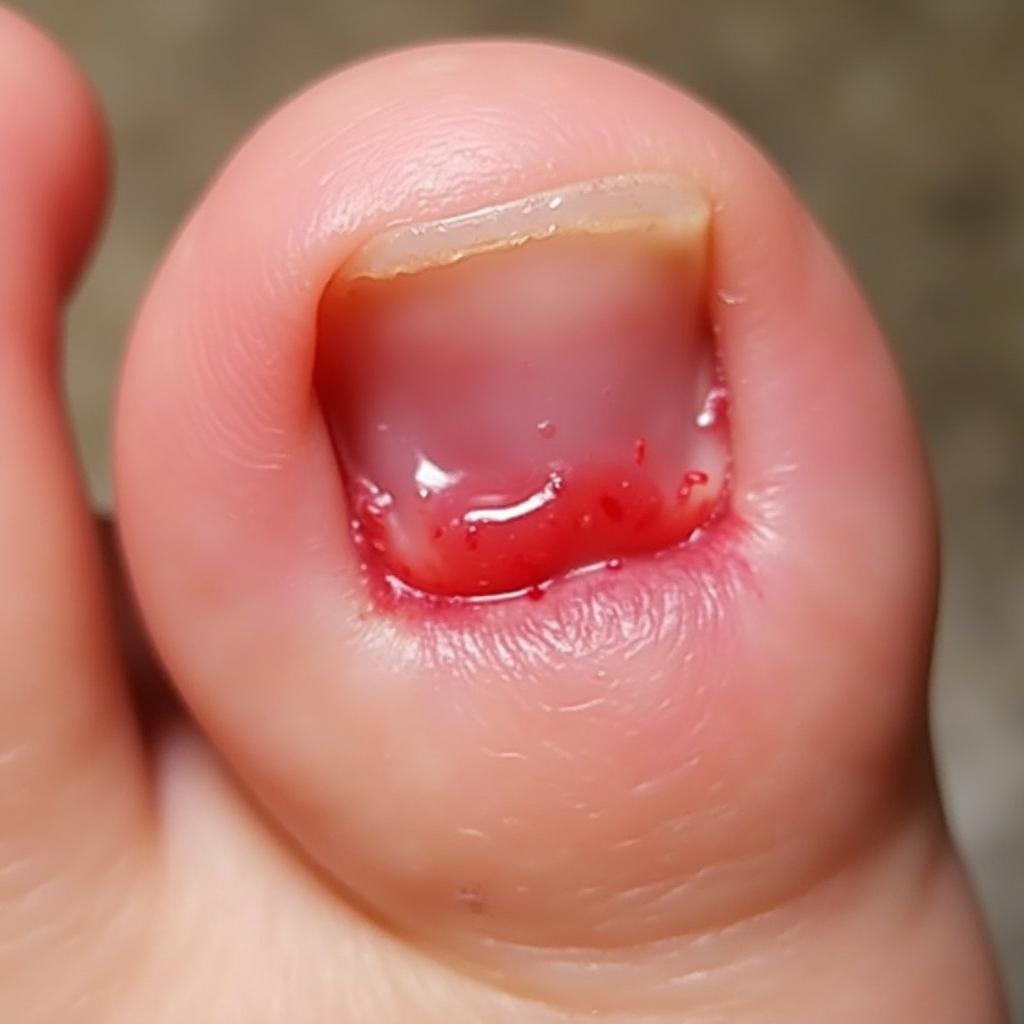Ingrown toenails are a common and painful problem. This guide provides comprehensive information on ingrown toenail self care, covering prevention, identification, and treatment options you can manage at home. Learn how to effectively address this issue and when to seek professional medical attention.
Understanding Ingrown Toenails
Ingrown toenails occur when the edge of your toenail, typically the big toe, grows into the surrounding skin. This can cause pain, redness, swelling, and sometimes infection. Several factors contribute to ingrown toenails, including improper nail trimming, tight-fitting shoes, genetics, and fungal infections. Understanding the causes is the first step in effective ingrown toenail self care.
Identifying an Ingrown Toenail
Recognizing the signs of an ingrown toenail is crucial for prompt treatment. Look for redness and swelling around the affected toe, tenderness to the touch, pain when pressure is applied, and sometimes pus or drainage. If you notice any of these symptoms, you likely have an ingrown toenail.
 Identifying an Ingrown Toenail
Identifying an Ingrown Toenail
Ingrown Toenail Self Care at Home
Several self-care measures can alleviate the discomfort of an ingrown toenail and promote healing.
- Soaking your foot: Soaking the affected foot in warm, soapy water for 15-20 minutes several times a day can help soften the skin and reduce inflammation. Epsom salt soaks can also be beneficial.
- Gentle lifting: After soaking, you can try gently lifting the ingrown edge of the nail. Use a clean cotton ball or dental floss to place a small piece of sterile cotton under the nail edge. This helps to separate the nail from the skin and encourage it to grow above the skin fold. Change the cotton daily.
- Over-the-counter pain relief: Over-the-counter pain relievers such as ibuprofen or acetaminophen can help manage pain and discomfort.
- Topical antibiotics: Applying antibiotic ointment to the affected area can help prevent infection. Cover the area with a clean bandage.
- Proper footwear: Avoid tight-fitting shoes and high heels. Opt for open-toed shoes or sandals to allow the toe to breathe and reduce pressure.
When to See a Doctor
While ingrown toenail self care can often be effective, certain situations require professional medical intervention. See a doctor if you experience severe pain, signs of infection such as pus, fever, or red streaks spreading from the area, or if the ingrown toenail doesn’t improve with home treatment. Individuals with diabetes or other conditions that affect circulation should always consult a doctor for an ingrown toenail.
Preventing Ingrown Toenails
Prevention is always better than cure. Follow these simple tips to prevent ingrown toenails:
- Trim your toenails straight across: Avoid cutting the corners or curving the edges.
- Wear shoes that fit properly: Ensure your shoes have enough room in the toe box to avoid pressure on your nails.
- Maintain good foot hygiene: Keep your feet clean and dry to prevent fungal infections.
“Trimming your toenails correctly is the cornerstone of ingrown toenail prevention,” says Dr. Emily Carter, a podiatrist specializing in foot and ankle care. “Straight across cuts prevent the nail from digging into the surrounding skin.”
Conclusion
Ingrown toenail self care can be effective in managing mild cases. By following the tips outlined in this guide, you can alleviate discomfort and promote healing. However, it’s essential to recognize when professional medical attention is necessary. Don’t hesitate to seek medical advice if your ingrown toenail shows signs of infection or doesn’t improve with home treatment. Proper ingrown toenail self care, combined with preventative measures, can keep your feet healthy and pain-free.
FAQs
- How long does it take for an ingrown toenail to heal?
- Can I use hydrogen peroxide on an ingrown toenail?
- What are the risks of not treating an ingrown toenail?
- Are there any home remedies for ingrown toenails besides soaking?
- When should I see a podiatrist for an ingrown toenail?
- Can ingrown toenails be recurring?
- How can I prevent ingrown toenails if I’m genetically predisposed to them?
Other Related Articles
- Toenail Fungus Treatment
- Foot Care Tips for Diabetics
Need Help? Contact us via WhatsApp: +1(641)206-8880, Email: cardiagtechworkshop@gmail.com Or visit us at: 276 Reock St, City of Orange, NJ 07050, United States. We have a 24/7 customer support team.


